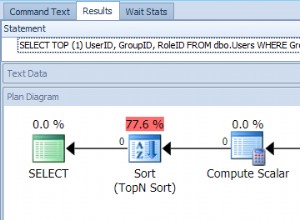Oltre alla risorsa/oggetto di connessione mysqli mancante, ci sono altri problemi con lo script:
- è incline alle iniezioni sql
- non stai testando la connessione mysql come mostrato in https://docs.php .net/mysqli.quickstart.connections
- lo script in generale non gestisce gli errori. Qualsiasi delle funzioni/metodi mysqli_* potrebbe non riuscire. Per esempio. l'avviso relativo a
mysqli_num_rowsè correlato al mancato controllo del valore di ritorno dimysqli_query. - la tua funzione test_input() non verifica nulla ma cambia il valore; e un indirizzo e-mail non ha nulla a che fare con htmlspecialchars() et al. Abbandona quella funzione.
- la convalida dell'indirizzo email sembra eccessivamente complessa senza ovvio merito.
- Invece di una combinazione SELECT/INSERT per impedire che un indirizzo email venga inserito due volte, basta creare un indice univoco su quel campo e il server mysql preverrà in modo affidabile i duplicati.
per esempio.
<?php
define('MYSQL_ER_DUP_KEY', 1022); // see https://dev.mysql.com/doc/refman/5.6/en/error-messages-server.html#error_er_dup_key
$errors = array();
if($_POST) // might be superfluous
{
// simplified email validation
// improve if needed
$email = filter_input(INPUT_POST, 'email', FILTER_VALIDATE_EMAIL);
if ( !$email ) {
// removed html/style from error message, better do that when printing the error
$errors['email1'] = "A valid email address is required";
}
// you only need the database connection after the email address is validated
$mysqli = new mysqli('localhost', 'root', '','ecommerce');
// see https://docs.php.net/mysqli.quickstart.connections
if ($mysqli->connect_errno) {
trigger_error("Failed to connect to MySQL: (" . $mysqli->connect_errno . ") " . $mysqli->connect_error, E_USER_ERROR);
}
// not checking if this email address is already in the database
// instead create a unique index for that field
// see https://dev.mysql.com/doc/refman/5.6/en/constraint-primary-key.html
// - otherwise you'd at least have to lock the table to avoid race conditions -
// sql injections: see https://docs.php.net/security.database.sql-injection
// to prevent sql injections you either have to make sure string literals are
// properly encoded/escaped or use preparead statements+parameters
$stmt = $mysqli->prepare('INSERT INTO subscriptions (email) VALUES (?)');
if ( !$stmt ) {
trigger_error("prepare statement failed (" . $mysqli->errno . ") " . $mysqli->error, E_USER_ERROR);
}
else if ( !$stmt->bind_param('s', $email) ) {
trigger_error("bind_param failed (" . $stmt->errno . ") " . $stmt->error, E_USER_ERROR);
}
else if ( !$stmt->execute() ) {
// email has a unique index, inserting an email address a second time
// results in a ER_DUP_KEY error
if ( MYSQL_ER_DUP_KEY==$stmt->errno ) {
$errors['email2'] = "email address already in subsription list";
}
else { // otherwise it's "really" an error
trigger_error("execute failed (" . $stmt->errno . ") " . $stmt->error, E_USER_ERROR);
}
}
else {
[... inserted ...]
}
}




